As an Amazon Associate I earn from qualifying purchases.
How to prepare ginger tea with fresh ginger root. It’s an anti-inflammatory, immune-boosting tea that’s cozy, soothing, vibrant, and perfect for cold/flu season! Plus, it’s ready in under 10 minutes!
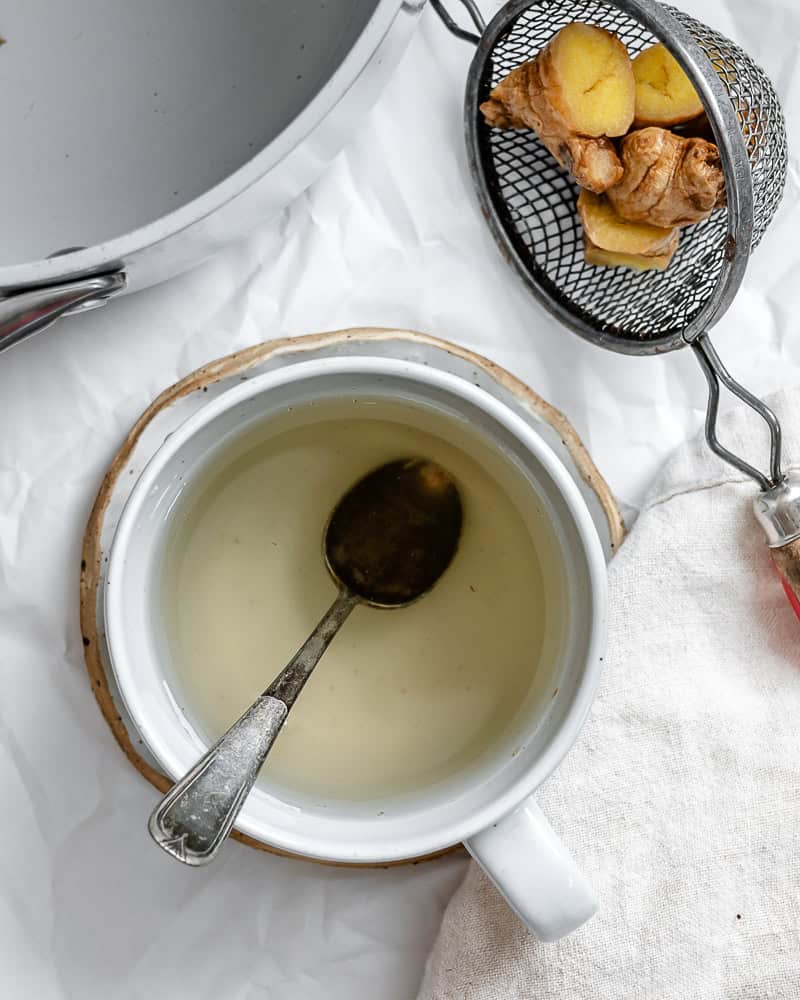
Anti-Inflammatory Homemade Ginger Tea
People have consumed ginger for thousands of years as an herbal treatment for all sorts of ailments (not to mention for its zingy, spicy kick of flavor), and it’s easy to see why. Along with lemon ginger turmeric shots and turmeric golden milk, this simple ginger tea is our favorite way to reap its benefits.
Contrary to its name, ginger tea contains no actual tea and is a 100% caffeine-free, optionally sugar-free, and practically calorie-free beverage made by steeping fresh ginger in hot water to create a vibrant, antioxidant-rich ‘infusion.’
This delicious brew will help you feel warm and cozy. It’s perfect for flu season, sore throats, upset tummies, and indigestion. It can even be enjoyed iced as a refreshing pick-me-up during warmer months. It’s super beneficial, too!
The Benefits of Ginger Root Tea
- Ginger contains phytonutrients with anti-inflammatory & antimicrobial benefits.
- Can help to soothe digestive issues – like nausea, bloating, and indigestion.
- May help reduce blood pressure and cholesterol while improving circulation.
- Can regulate blood sugar levels.
- Has pain-relieving properties – for headaches, migraines, menstrual cramps, etc.
- The reduction of pain/inflammation also benefits rheumatoid arthritis/osteoarthritis.
- It contains lots of antioxidants with anti-cancerous benefits.
- Ginger root in tea can soothe sore throats and can help ease cold symptoms.
Check out this Healthline article for more medically reviewed info on ginger tea benefits.
The Ingredients
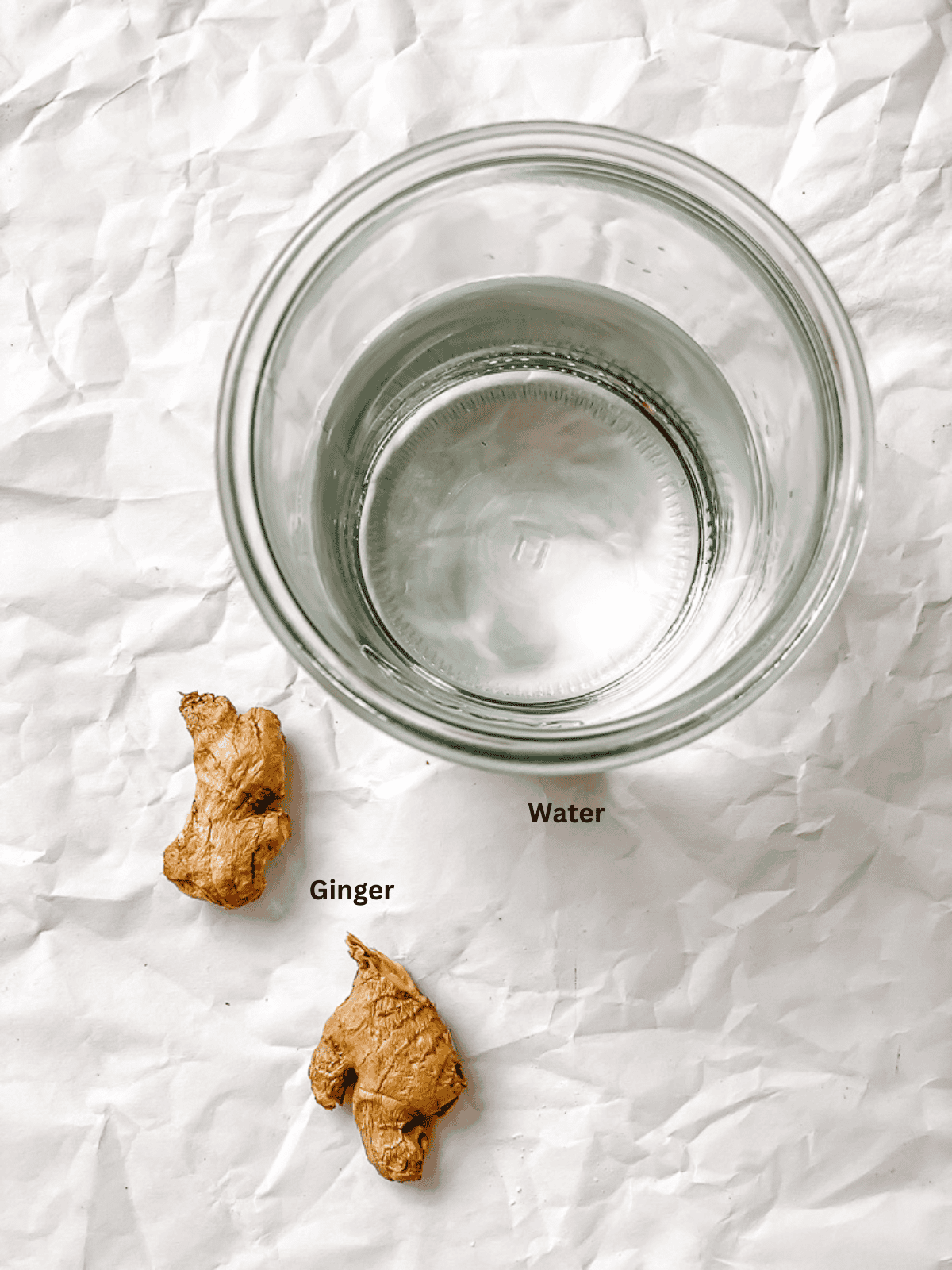
Ginger Tea Recipe Variations
- Turmeric ginger tea: Add (½-inch piece) finely sliced or (about 1 tsp) powdered turmeric. Turmeric can increase the antioxidant capacity in your body and improve heart health, brain health, joint pain, blood pressure, and more.
- Cinnamon and ginger tea: (Or try lemon cinnamon ginger tea). Adding a cinnamon stick tastes great and contains antioxidants and other beneficial compounds with anti-inflammatory, blood sugar, and heart health benefits.
- Ginger mint tea: Add a few mint leaves (we prefer peppermint) for a cold and flu-busting, detoxing, digestion-friendly, anti-inflammation tea.
- Lemongrass ginger tea: Gently crush/bruise 1-2 lemongrass stalks and add them to the steeping tea for extra fragrance and several benefits for the body and mind.
- Garlic and ginger tea: Slice a garlic clove in the tea for an antioxidant-rich drink perfect for sore throats, boosting the immune system, and more.
- Tea: For added caffeine, steep it with black or green tea leaves/bags.
How to Make Ginger Tea From Ginger Root
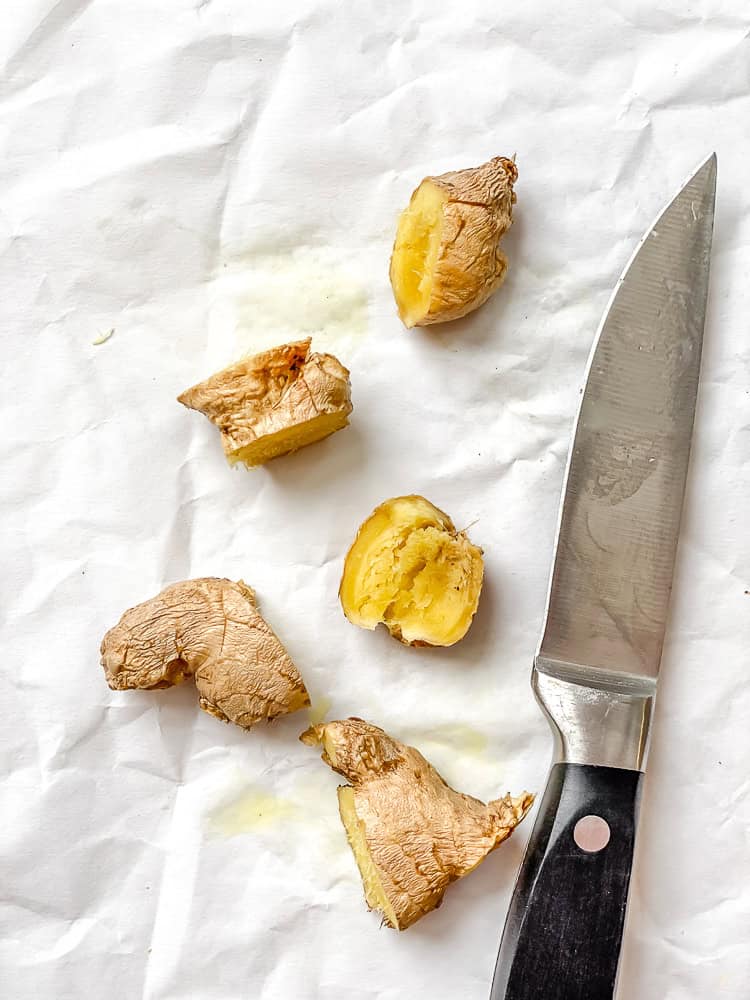
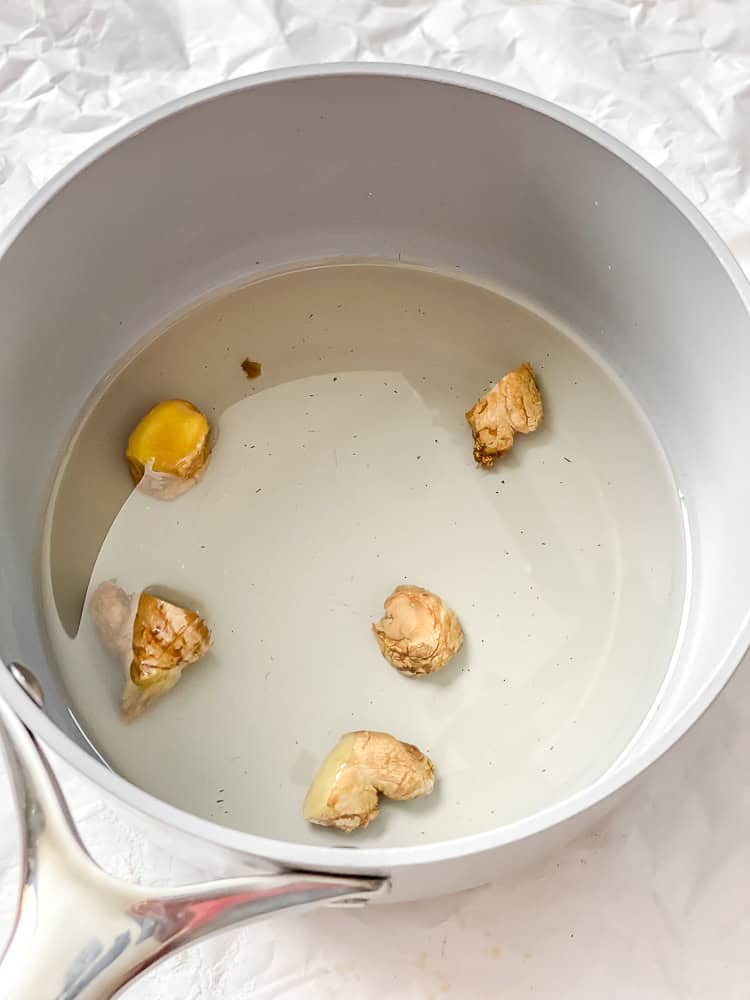
Step 1: First, wash, then roughly chop the ginger into ½-inch chunks (or slice it – peeling is optional). With the side of your knife, gently crush the ginger chunks. This will help the flavor infuse better into the ginger root tea.
Step 2: Add the water and ginger to a medium, lidded saucepan and bring to a boil, then immediately reduce the heat to a simmer, cover, and cook for 5 minutes.
The longer it simmers, the stronger the flavor becomes. However, too long, and it can become overly bitter.
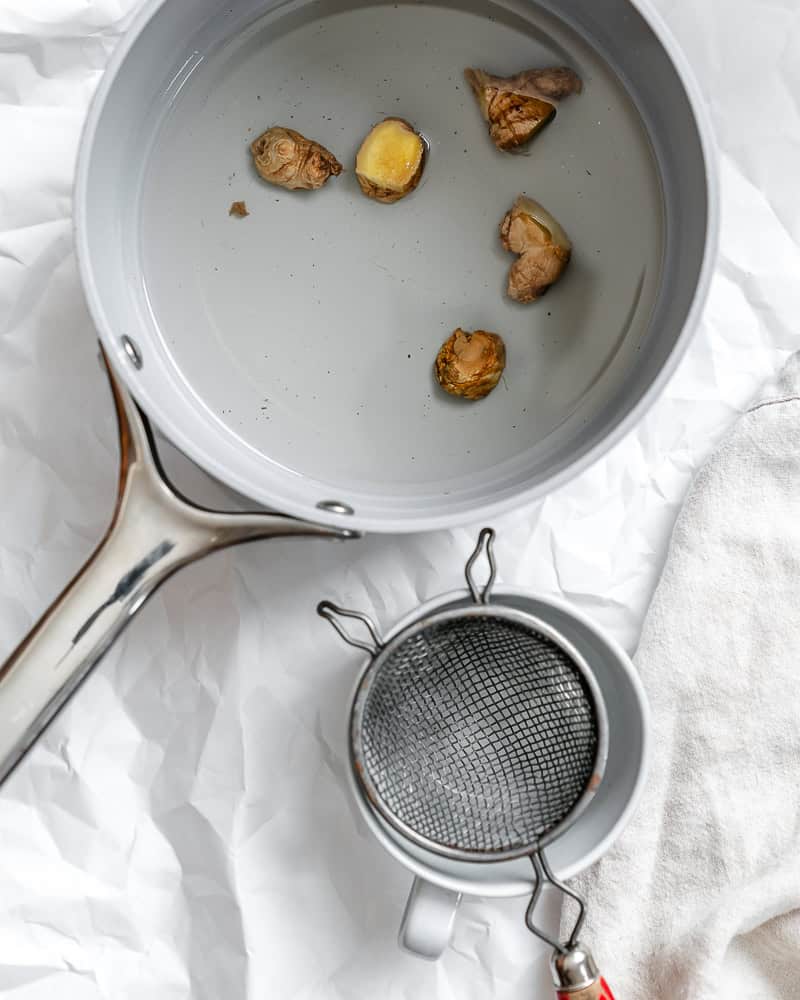
Step 3: Remove the pot from the heat and optionally squeeze in the juice of about half a lemon. Then strain the mixture (to remove the ginger chunks) into a mug. Enjoy the ginger lemon tea hot or cold!
By adding the lemon juice at this point rather than adding lemon slices to the saucepan, you can more precisely adjust the amount to taste.
FAQs
It can be beneficial in smaller amounts but can have the opposite effect (especially if consumed in large quantities) for those who are more prone to acid reflux.
You can usually reuse the ginger when making ginger tea for another batch or two. Alternatively, try adding it to smoothies (like this mango blueberry smoothie), stocks, to cook (e.g., stir-fries (like this vegetable noodle stir fry), marinades, etc.), in baking, or even freeze it to use later.
If the flavor has been fully extracted, you can also compost the ginger.
Yes, though it won’t taste as vibrant/flavorful. You’ll need about 1 teaspoon of ginger powder per cup (250ml) of water. Steep for 5-10 minutes in boiling water, then strain and enjoy.
Pro Recipe Tips
- Use the freshest ginger: We recommend using organic ginger, when possible, making sure it’s super fresh for the very best flavor.
- Lightly crush the ginger: This helps to extract the most flavor.
- For milder/stronger flavor: How much ginger you use and the steeping time has the most effect on the fresh ginger tea flavor intensity.
- Don’t boil the tea: We bring it to a boil then immediately reduce it to a simmer. Boiling it too long makes the tea bitter.
- The yield: After simmering, the amount of water will reduce (simmer with the lid on to avoid too much water ‘shrinkage’), so add a little extra water if preferred.
Storage Instructions
If you’re making enough fresh ginger tea for several servings, remove the ginger chunks from the pot—otherwise, the tea will become overly strong and bitter.
Then, allow it to cool and store it in an airtight jug/container in the fridge for 5-7 days. You can also freeze it in an ice cube tray for up to 3 months.
When serving, either reheat gently on the stove or enjoy it cold with ice.
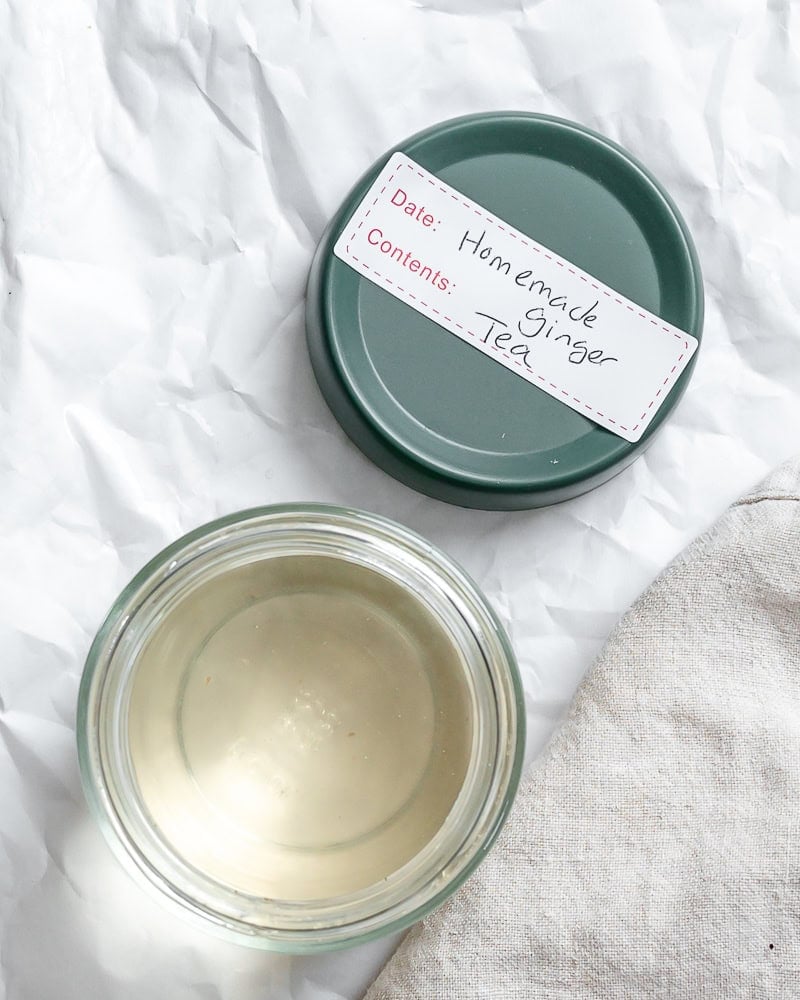
How to Make Ginger Tea [With Ginger Root]
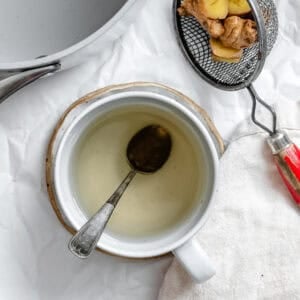
Equipment
Ingredients
- 2-inch chunk of fresh ginger
- 2 cups of water
- 1 lemon (optional)
Instructions
- Wash the unpeeled ginger and chop into ½ inch chunks. With the side of your knife, crush the ginger chunks.
- Place the water in a medium saucepan with a lid. Add the ginger and bring to a boil.
- Lower the heat to a simmer, cover with the lid, and simmer for 5 minutes. The longer it simmers, the stronger the ginger flavor.
- Turn off the heat and squeeze half a lemon (if using). Serve by straining the tea into a mug.
- Enjoy hot or cold.
Notes
- Use the freshest ginger: We recommend using organic ginger, when possible, making sure it’s super fresh for the very best flavor.
- Lightly crush the ginger: This helps to extract the most flavor.
- For milder/stronger flavor: How much ginger you use and the steeping time has the most effect on the fresh ginger tea flavor intensity.
- Don’t boil the tea: We bring it to a boil then immediately reduce it to a simmer. Boiling it too long makes the tea bitter.



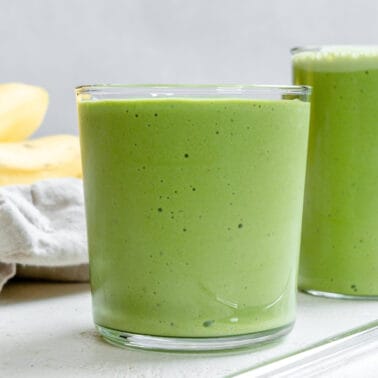
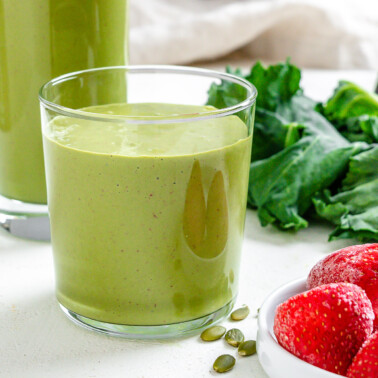
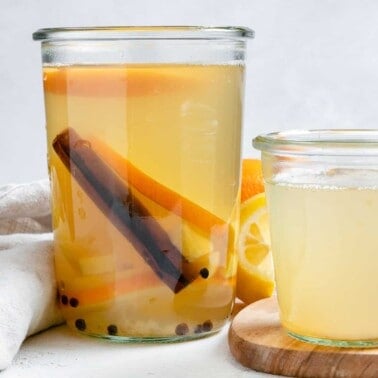
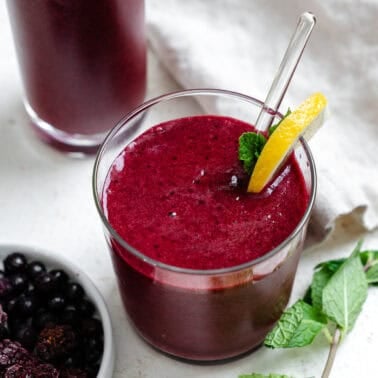







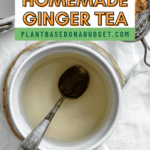
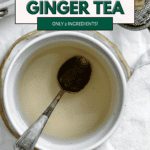
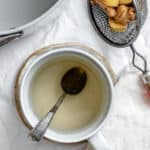
Love how easy this tea is to make!